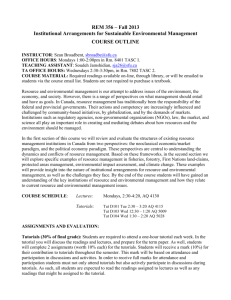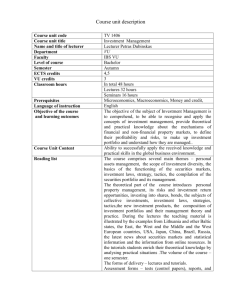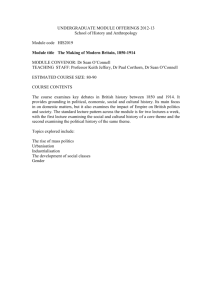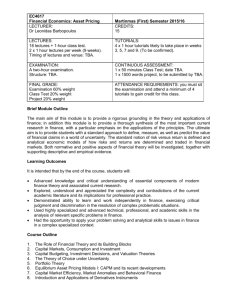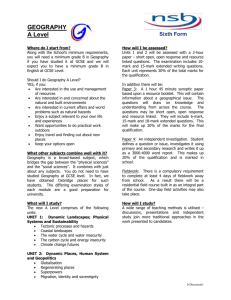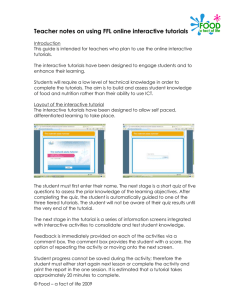Lecture
advertisement
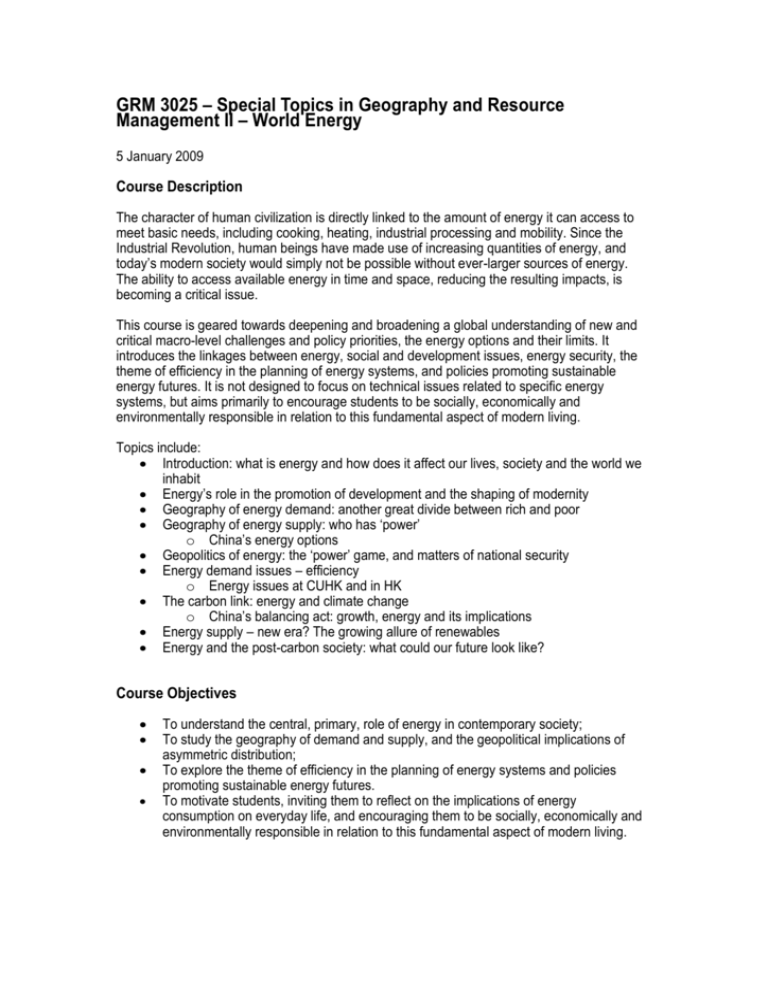
GRM 3025 – Special Topics in Geography and Resource Management II – World Energy 5 January 2009 Course Description The character of human civilization is directly linked to the amount of energy it can access to meet basic needs, including cooking, heating, industrial processing and mobility. Since the Industrial Revolution, human beings have made use of increasing quantities of energy, and today’s modern society would simply not be possible without ever-larger sources of energy. The ability to access available energy in time and space, reducing the resulting impacts, is becoming a critical issue. This course is geared towards deepening and broadening a global understanding of new and critical macro-level challenges and policy priorities, the energy options and their limits. It introduces the linkages between energy, social and development issues, energy security, the theme of efficiency in the planning of energy systems, and policies promoting sustainable energy futures. It is not designed to focus on technical issues related to specific energy systems, but aims primarily to encourage students to be socially, economically and environmentally responsible in relation to this fundamental aspect of modern living. Topics include: Introduction: what is energy and how does it affect our lives, society and the world we inhabit Energy’s role in the promotion of development and the shaping of modernity Geography of energy demand: another great divide between rich and poor Geography of energy supply: who has ‘power’ o China’s energy options Geopolitics of energy: the ‘power’ game, and matters of national security Energy demand issues – efficiency o Energy issues at CUHK and in HK The carbon link: energy and climate change o China’s balancing act: growth, energy and its implications Energy supply – new era? The growing allure of renewables Energy and the post-carbon society: what could our future look like? Course Objectives To understand the central, primary, role of energy in contemporary society; To study the geography of demand and supply, and the geopolitical implications of asymmetric distribution; To explore the theme of efficiency in the planning of energy systems and policies promoting sustainable energy futures. To motivate students, inviting them to reflect on the implications of energy consumption on everyday life, and encouraging them to be socially, economically and environmentally responsible in relation to this fundamental aspect of modern living. Teaching format and learning activities Lecture series: Provide background information and the necessary concepts that are important to develop effective knowledge of the course content. Presentation and discussion: students will prepare presentations based on selected readings linked to their term-end research paper. Tutorials: Give students the opportunity to review and discuss specific topics mentioned during lectures in greater detail. Tutorials will complement and be linked to lectures, and reading. Some tutorial work will be done in groups to encourage teamwork and cooperation. Literature review paper: all students are required to write a 2,500-word essay. Course readings: Lecture readings will be recommended one-week prior to the relevant class. Additional readings will be suggested for each tutorial. Additional, detailed advice will be available for students researching their essays. Term-end research paper: students will prepare a final essay, demonstrating their argumentative skills as well as a clear understanding of the main themes discussed during the course. Online: The course will be supported by Moodle (https://moodle.cuhk.edu.hk), which will provide a forum for discussions, exchange, and the updating of information that is relevant to the teaching and learning process. Additional communication: The teacher and tutor will be available throughout the semester to discuss or address issues of concern that students may have or questions arising from the lectures, tutorials, field trip and essay. Learning Outcomes After successfully completing this course, students will be able to: Understand concepts relating to energy, society and the environment; Develop an understanding of the geography and geopolitics of energy; Study and critically review the options for future sustainable energy paths. Course Syllabus Lecture 1. 2. 3. 4. 5. 6. 7. 8. 9. 10. 11. 12. Topic Energy – introducing the concepts Energy, development and modernity Energy and the environment: local and global Geography of energy demand Geography of energy supply Geopolitics of energy, balancing demand and supply Fossil fuels Renewables (RES) Energy efficiency Energy in China: a fine balancing act? Energy supply – new era? Energy and society Note: The order of each lecture is indicative and is subject to change. Tutorial topics: Tutorials provide students with the opportunity to review and discuss specific topics mentioned during lectures in greater detail. Tutorials will complement and be linked to lectures. – – – – Energy at CUHK Hong Kong on a day without energy Sustainable energy futures: what would the world look like? Fourth Tutorial – topic to be confirmed Teaching and learning activities Lecture Interactive tutorial Other (please specify) Documentary review & discussion ( 24 ) hr (8) hr (2 ) hr Tentative assessment method Assignment Literature review paper Group tutorials and participation in class Other (Please specify) Term-end research paper 25 40 35 Assigned: 3/3/09 Final hand in 24/3/09 likely to start by mid-February 2009 – to be discussed Assigned: 20/4/09 Final hand in 27/4/09

